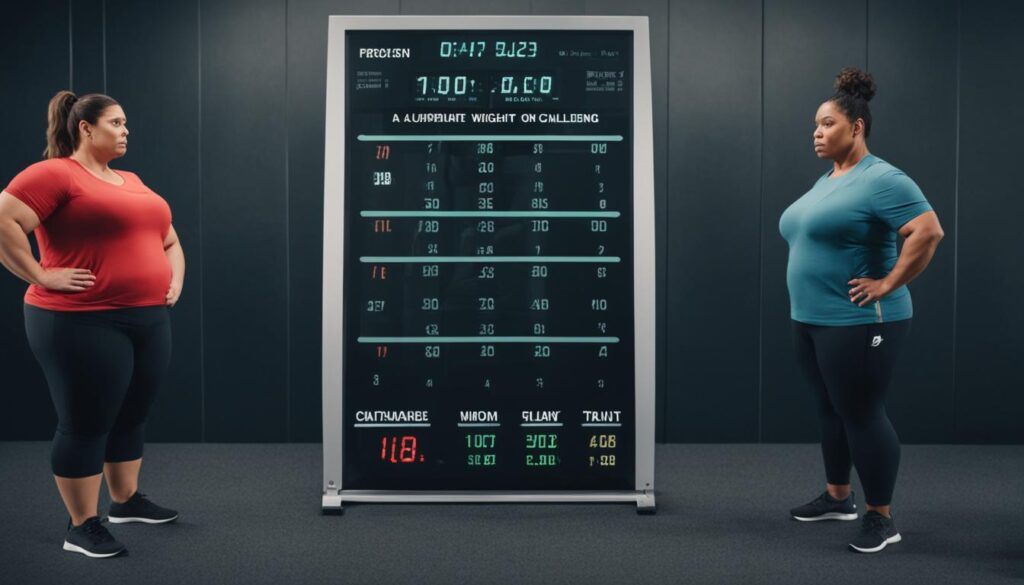In a weight loss challenge, determining the winner is not simply about the total amount of weight lost but rather the fair and accurate measurement of progress (check out my post on weight loss challenge here). By establishing specific criteria and guidelines, organizers can ensure that the competition is conducted in a motivating and unbiased manner.
When it comes to determining the winner in a weight loss challenge, it is crucial to focus on the percentage of body fat or body weight lost. This approach allows for a fair comparison among participants with different starting points, creating a level playing field.
To ensure accuracy and fairness, consistent and reliable measurement tools should be used throughout the competition. It is also important to have specific weigh-in times and regularly reassess participants’ progress.
Key Takeaways:
- Focus on the percentage of body fat or body weight lost, rather than the total amount, to determine the winner in a weight loss challenge.
- Use consistent and reliable measurement tools to ensure accuracy and fairness.
- Establish specific weigh-in times and regularly reassess participants’ progress.
- Consider the duration of the challenge, typically between 6 and 12 weeks, to allow for meaningful progress.
- Emphasize healthy weight loss and discourage extreme measures to set realistic expectations for participants.
Setting Up the Challenge
When organizing a weight loss challenge, it is crucial to establish clear rules and guidelines to ensure a fair and engaging competition. Here are some key factors to consider when setting up the challenge:
Duration
The duration of the weight loss challenge plays a vital role in keeping participants motivated. It is recommended to choose a duration between 6 and 12 weeks. This time frame allows enough time for healthy, sustainable weight loss without being too long and demotivating.
Guidelines and Rules
To maintain consistency and fairness, clear guidelines and rules need to be established. These guidelines should include:
- Specific dates for the challenge start and end
- Designated weigh-in times
- Any specific activities or requirements
By setting these guidelines, participants can plan their weight loss journey effectively and adhere to a structured competition (check out my post on weight loss journey here).
Realistic Expectations
It is essential to set realistic expectations for the participants, emphasizing the importance of healthy weight loss rather than quick fixes or extreme measures. Educate them about the benefits of gradual weight loss and the importance of incorporating exercise and a balanced diet for long-term success.
Individual or Team Competition
Depending on the dynamics of the weight loss challenge, participants can either compete individually or be organized into teams. This decision can be based on factors such as group motivation, camaraderie, or friendly competition. Both approaches have their advantages, and the choice ultimately depends on the goals and preferences of the participants.
Entry Fee and Prizes
Consider implementing an entry fee and offering prizes to enhance motivation and engagement. The entry fee can be used to cover administrative expenses or donated to a charitable cause. Prizes can include cash rewards, fitness-related gifts, or experiences that align with a healthy lifestyle.
By carefully considering these weight loss challenge rules and guidelines, organizers can set the foundation for a successful and engaging competition that promotes healthy habits and supports participants in reaching their weight loss goals.
| Setting Up the Challenge | Description |
|---|---|
| Duration | 6-12 weeks, providing an optimal time frame for sustainable weight loss |
| Guidelines and Rules | Establish clear rules, including start and end dates, weigh-in times, and specific activities or requirements |
| Realistic Expectations | Emphasize healthy weight loss methods and discourage extreme measures |
| Individual or Team Competition | Choose between individual or team-based competition, considering participant preferences and motivations |
| Entry Fee and Prizes | Consider an entry fee and prizes to enhance motivation and engagement |
Measuring Success

When it comes to determining the winner in a weight loss challenge, measuring success accurately and fairly is crucial. Different methods can be used to gauge progress, but one effective approach is to calculate the percentage of weight or body fat lost by each participant. This allows for a fair comparison among individuals with different starting weights and body compositions.
For example, let’s say Participant A starts the challenge weighing 200 pounds and loses 10 pounds, while Participant B starts at 150 pounds and also loses 10 pounds. In terms of total weight lost, both participants achieved the same result. However, calculating the percentage of weight lost reveals a different picture. Participant A lost 5% of their body weight, while Participant B lost 6.7%. By using this percentage-based approach, we can determine that Participant B made a greater relative effort towards achieving their weight loss goals.
In addition to considering weight loss percentages, it is essential to establish clear criteria for determining the winner. This could be based on factors such as the highest percentage of weight or body fat lost, or even maintaining a weight within a certain range. By defining specific winner criteria, participants have a clear understanding of what they need to achieve and can set realistic goals accordingly. This promotes a fair and transparent environment for all contestants.
To ensure accurate tracking of progress, regular record-keeping and feedback are essential components of a successful weight loss challenge. Participants should have access to individualized progress reports that detail their weight loss journey. This not only allows them to track their own progress but also provides an opportunity for organizers to offer personalized feedback, guidance, and motivation throughout the challenge.
“Calculating the percentage of weight lost allows for a fair comparison among participants with different starting weights.”
By implementing these measures, weight loss challenges can be conducted in a manner that rewards participants based on their individual efforts and achievements. This approach encourages healthy and sustainable weight loss practices while fostering a supportive and motivating environment.
Ensuring Fairness
In order to maintain fairness in a weight loss challenge, it is crucial to establish clear rules and guidelines that apply to all participants. Using consistent measurement tools, such as the same scale or body fat assessor, throughout the competition is essential to avoid giving any participants an unfair advantage. This ensures that everyone is evaluated using the same criteria, promoting an equal playing field.
Another important aspect of maintaining fairness is to establish specific weigh-in times and dates. This ensures that participants have an equal opportunity to participate and prevents any discrepancies in measuring progress. By setting clear guidelines, organizers can eliminate any confusion or potential bias, creating a transparent and equitable competition.
Splitting participants into different groups, such as men and women, can also help create a level playing field and make everyone feel equally successful. This takes into account any physiological differences between genders and allows for fair comparisons within each group. Participants can still compete for the weight loss competition winner title while feeling supported and acknowledged in their respective groups.
Overall, ensuring fairness in a weight loss challenge requires consistency, transparency, and equal opportunities for all participants. By implementing these guidelines, organizers can create an environment where everyone has a fair chance to succeed and be recognized for their achievements.
Recognizing Achievements

In a weight loss challenge, it is crucial to recognize and celebrate the accomplishments of participants. Acknowledging their hard work and dedication can provide the motivation to keep pushing forward. Here are some effective ways to recognize achievements:
1. Publication of Top Performers
One way to recognize participants’ achievements is by publishing the names of the top performers. This can be done without disclosing specific weight loss details, to avoid embarrassing those who may have had lesser progress. By highlighting the individuals who have shown exceptional commitment and results, it inspires others to strive for success.
2. Providing Prizes or Incentives
To further motivate participants, it is beneficial to offer prizes or incentives for reaching certain weight loss standards or goals. The weight loss challenge prize can be anything that aligns with healthy habits and supports their journey, such as gym memberships, wellness retreats, or fitness gadgets. This not only rewards their hard work, but also encourages continued engagement and perseverance.
3. Focus on Individual Success
While friendly competition is an integral part of a weight loss challenge, it is essential to emphasize individual success. Celebrating each participant’s progress, regardless of where they stand in the rankings, creates a supportive and motivating environment. Recognize milestones, personal bests, and positive changes in habits and mindset. This approach fosters inclusivity and ensures that everyone feels encouraged and valued.
Recognizing achievements is a powerful way to sustain motivation in a weight loss challenge. By publicly acknowledging and rewarding participants’ efforts, you not only inspire them to continue their journey but also cultivate a positive and supportive community.
Preventing Cheating

In any weight loss challenge, the integrity of the competition is of utmost importance. It is crucial to have clear rules and guidelines in place to prevent cheating and ensure fairness. Here are some weight loss challenge rules and guidelines to help maintain a level playing field:
- Create strict accountability measures: Implementing stringent guidelines and measures for accountability can deter participants from cheating. This can include regular weigh-ins, documentation of progress, and penalties for dishonesty.
- Disqualify cheaters: If cheating is discovered, it is essential to take prompt action. Disqualifying individuals who are found to be cheating sends a clear message that dishonesty will not be tolerated.
- Promote transparency: Encourage participants to be open and transparent about their weight loss journey. This can create an atmosphere of trust and discourage fraudulent practices.
- Provide support and education: Educate participants about healthy weight loss methods and the importance of honesty in achieving their goals. Offering support and guidance can help participants stay motivated and focused, reducing the temptation to cheat.
Remember, the ultimate goal of a weight loss challenge is to promote healthy lifestyle changes and personal growth. Cheating undermines the spirit of the competition and can have negative effects on participants’ well-being.
By enforcing weight loss challenge rules and guidelines, organizers can maintain the integrity of the competition and create an environment where participants feel empowered to achieve their goals honestly.
Conclusion
Determining the winner in a weight loss challenge requires careful consideration of various factors. Organizers must establish fair criteria, provide clear guidelines, and utilize consistent measurement methods. By following these guidelines, a weight loss challenge can be transformed into a motivating and engaging competition that promotes healthy habits and celebrates individual success.
The goal of a weight loss challenge is to create an environment where participants can achieve their weight loss goals with the support and motivation they need. By implementing fair criteria, such as calculating the percentage of body fat or weight lost, participants with different starting points can be compared fairly. This ensures that the winner is determined based on overall progress rather than just the total amount lost.
Furthermore, it is crucial to emphasize the importance of healthy weight loss and discourage extreme measures. Setting realistic expectations and providing regular feedback on participants’ progress can help them stay focused and engaged throughout the challenge. Recognizing and celebrating achievements, both individually and collectively, can further enhance motivation and create a supportive atmosphere.
In conclusion, a well-structured weight loss challenge, with fair criteria, clear guidelines, and consistent measurement methods, can yield successful results. By prioritizing the well-being and progress of participants, organizers can create an environment where individuals can achieve their weight loss goals and lead healthier lives.




